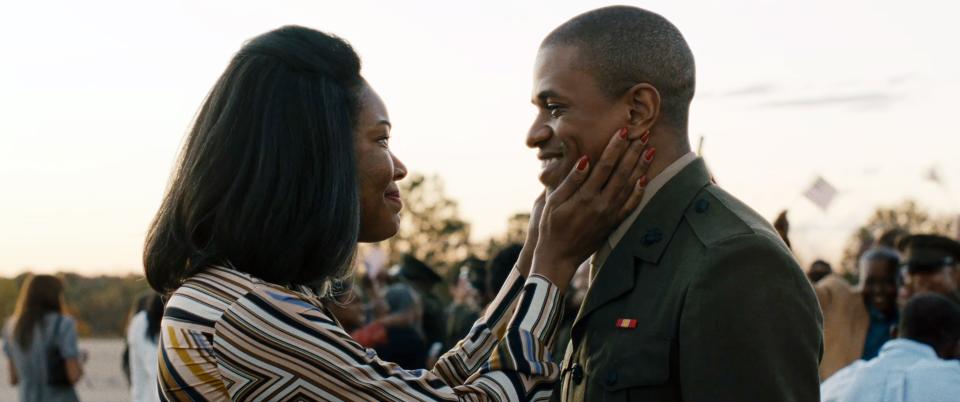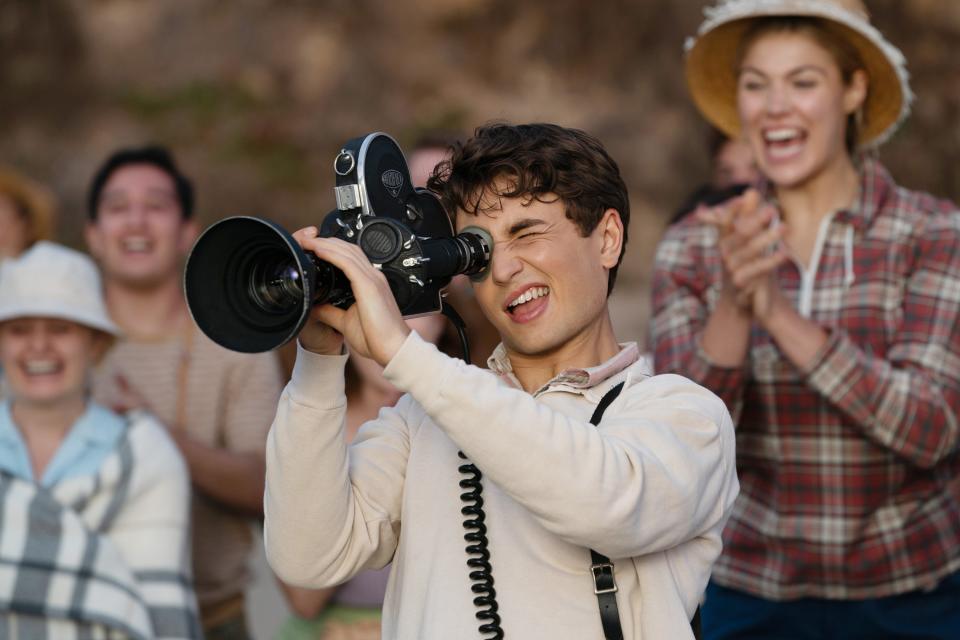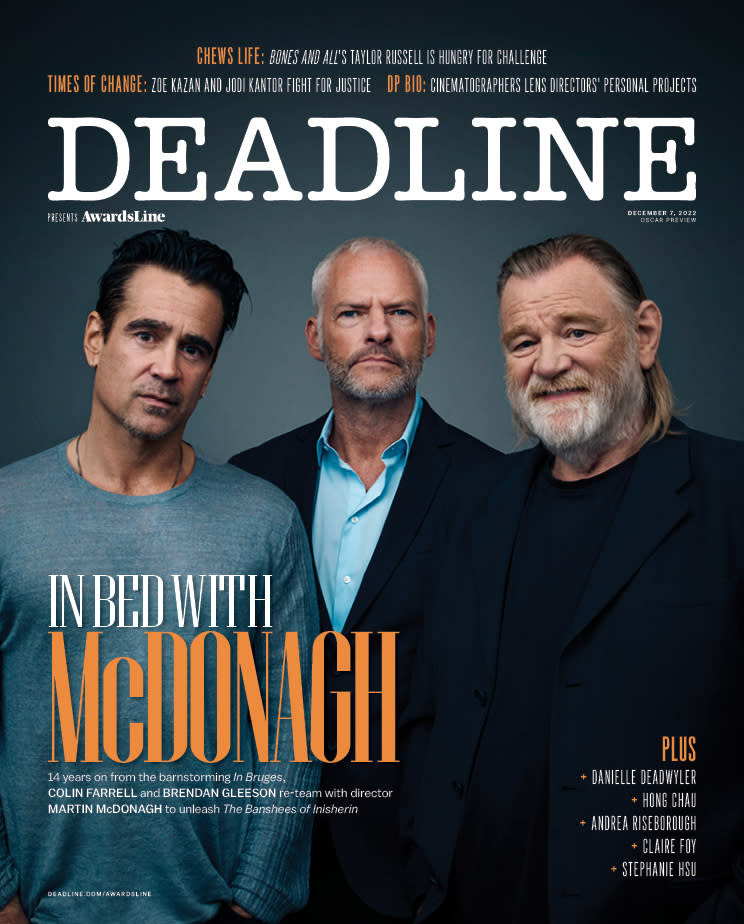‘Armageddon Time’, ‘The Inspection’ And ‘The Fabelmans’ Cinematographers On Bringing Directors’ Personal Stories To The Screen
- Oops!Something went wrong.Please try again later.
- Oops!Something went wrong.Please try again later.
- Oops!Something went wrong.Please try again later.
- Oops!Something went wrong.Please try again later.
- Oops!Something went wrong.Please try again later.
- Oops!Something went wrong.Please try again later.
- Oops!Something went wrong.Please try again later.

Every director brings a piece of themselves to their work, but this Oscar season has seen films becoming ever more personal. And it’s up to the cinematographer to work with their director to bring those stories to life.
James Gray explores his relationship with his grandfather and a pivotal childhood friendship in Armageddon Time; a young, gay Black man looks for his mother’s approval by joining the Marines in The Inspection, using actual quotes from Elegance Bratton’s mother; and Steven Spielberg’s The Fabelmans shows the early life of a young filmmaker and his family’s influence on his art.
More from Deadline
Related Story
Golden Globes Film Analysis: Cruise Is Snubbed, Fraser Isn't & A Mixed Bag For Diversity
Related Story
Steven Spielberg Tells Martin Scorsese Why A Very Private Director Made 'The Fabelmans' & How Laura Dern Convinced David Lynch To Play John Ford
Related Story
'Bardo' Brothers: Alejandro González Iñárritu & Darius Khondji On Finding Kinship, Harnessing Light & Why Simple Scenes Are Sometimes Hardest To Stage
Armageddon Time
Armageddon Time brings the viewer into 1980s Queens to follow Paul Graff (Banks Repeta), a Jewish-American boy on the cusp of adolescence. Paul is a stand-in for James Gray, who wrote and directed this, his own coming-of-age story. Cinematographer Darius Khondji, who had just wrapped up Alejandro G. Iñárritu’s surreal exploration of trauma with Bardo, worked closely with Gray to highlight Paul’s emotional journey. “I love having the director himself telling me, in his own words, what he was really feeling,” says Khondji.
Getting into the director’s emotional state was key, as the film dove into meaningful relationships that shaped his childhood. One relationship was with his grandfather, played by Anthony Hopkins. “The scenes are very different with his grandpa,” says Khondji. “When we were filming [Hopkins], the voice of reason, we were filming his face. His face was almost like a library, like opening an incredible book of who his grandfather was.”
The connection between Paul and his grandfather contrasts with the relationship between Paul and his father, played by Jeremy Strong. “The scene with his father was much more strong and violent, sharper and more vivid,” says Khondji. After Paul gets in trouble at school, he locks himself in the bathroom to avoid his father, who comes in and beats him with a belt. “The bathroom was quite challenging because the rooms we were shooting in were always small. We had to put ourselves in small corners and shoot very straightforward, directly at the father and [Paul].”
Since everything in the film is from Paul’s perspective, the scenes with adults are shot from a lower angle, to simulate looking up. “The camera was always lower, almost like another floor,” says Khondji. For Paul’s relationship with fellow classmate Johnny (Jaylin Webb), the change in camera angle represented an equality between the boys as neither was an imposing force from above. “It was very interesting because with the children, it was more about the movements. It was against the film about faces.”

The Inspection
Writer-director Elegance Bratton brings a painful exploration of a longing for acceptance in The Inspection. Ellis (Jeremy Pope) is a young, gay Black man who seeks acceptance from his mother (Gabrielle Union) and decides to join the Marines. Bratton charged cinematographer Lachlan Milne with bringing his story to the screen. “I’m a big fan of trying to not influence things photographically too much if it feels like it takes away from the story,” says Milne.
When Milne and Bratton connected to discuss creative influences, they found a common reference in Claire Denis’ 1999 French film Beau Travail. “Both for the masculinity and the tone of the film, but also the photography,” he says. “It had quite a documentary style at times, which we wanted to bring into certain scenes.” Milne decided that the documentary style of filming worked best for exterior shots, in scenes where the camera could be restrained to just observe while the cast played in the wide shot. “We both wanted it to feel as spontaneous as possible, because the performances could change or the actors, particularly Nick [Logan] who played Brooks, would improvise in a really creative, clever way.”
As he joins the Marines during the era of “Don’t Ask, Don’t Tell,” Ellis struggles to disguise his sexual orientation. Milne worked with Bratton to bring Ellis’s sexual thoughts and fantasies to the screen, to contrast the harsher reality. “We talked a lot about color and frame rate, and it was always going to be driven by a strong musical cue” he says. To highlight the fantasy aspect, Milne filtered colors and changed frame rates to create a stylized and heightened look. “It’s something that you would never expect to see visually in that kind of environment, strictly from a color side of things, regardless of whatever the performances might be.”
Unfortunately, due to Covid travel restrictions, Milne was unable to film the scenes between Ellis and his mother, though he was able to give some direction. “We spoke tonally about those scenes,” he says. “[Bratton] expressed the amount of emotional significance that those things had.” While most of the film was loosely based on Bratton’s personal experiences joining the Marines, the scenes with his mother were different. “Those are the ones that are closest to reality. It’s very hard to see and read those words on a script knowing that it’s drawn from his own personal experiences.”

The Fabelmans
Cinematographer Janusz Kamiński has worked with Stephen Spielberg since the ’90s with Class of ’61, so he has seen the director put pieces of himself into many films. “Steven always used his life experience, his fears or his worries to enrich the story that he was making,” Kamiński says. With The Fabelmans, Spielberg gave Kamiński an even greater insight into how the filmmaker got his start. The film follows Sammy (Gabriel LaBelle), a young man growing up in post-World War II era Arizona who finds himself enthralled by the movies.
A large part of the film is Sammy learning how to make movies, which meant that Kamiński was the cinematographer for those films as well. “Sammy’s movies are much more polished than his original movies,” he says. “That was a very conscious choice on our part, because we wanted to show that talent and that genius that he has.” The film tracks Sammy discovering new ways to achieve the effects he wanted, like poking holes in the film to get pops of light that simulate gunshots.

While Sammy’s films may be crude compared to Spielberg’s current work, Kamiński says that it highlighted how “childish” the process of filmmaking still is. “We still make movies like that. We still throw dust, and shake the cars and move branches across windows—they’re techniques we’ve been using since the beginning of the movies. Stephen employed very sophisticated techniques to make his movies look professional… for a kid who is 12 or 13 making war movies.”
The Fabelmans explores Spielberg’s upbringing and the way his parents influenced his work. “I think the time was right,” says Kamiński. “Unfortunately, what made the time right is that both his parents passed away, so he felt rather obligated to tell the story of his family and how he fits into it.” While some aspects are fictionalized, most story points, like his mother’s affair, are true to life. Kamiński says it was “very brave to expose that to an audience that perhaps has a very ideal view of who this guy is. He’s the most successful director in the world, but we all have our issues. We all have our pain.”
Best of Deadline
Sign up for Deadline's Newsletter. For the latest news, follow us on Facebook, Twitter, and Instagram.

